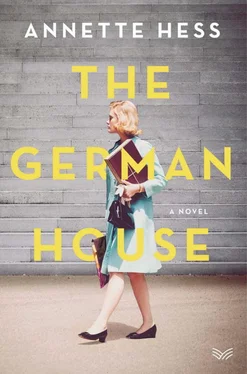Jürgen steered the car a bit too close to the sidewalk. The rubber tires squealed against the curb. Stefan reached for Eva’s hand. Eva felt the snow melting inside her bodice. Jürgen switched off the engine and sat in the car for another moment. He would never forget this scene: the two women—one fat and one short—standing at the window above the word “House,” in the mistaken belief that he couldn’t see them, the boy with the sled gawking at him, and the father, massive, standing in the door to the restaurant with a snow shovel, ready for anything. They studied him as though he were a defendant entering the courtroom and taking his place for the first time. Except for Eva. Hers was a gaze of anxious love.
Jürgen swallowed, put on his hat, and picked up a bouquet wrapped in tissue paper from the passenger seat. He got out and approached Eva. He was about to smile, when something nipped him painfully in the back of the leg. A dachshund. “Purzel! No! No!” Eva cried. “Stefan, bring him inside. Put him in the bedroom!”
Stefan protested, but grabbed the dog and carried the struggling animal back into the house. Eva and Jürgen locked eyes timidly. They weren’t entirely sure how to greet one another with Eva’s family watching, so they shook hands and began speaking at the same time.
“I’m sorry, they’re just so curious.”
“What a welcoming committee! To what do I owe the honor?”
The moment Jürgen released Eva’s hand, her father, mother, and sister vanished from their posts, like rabbits slipping into their burrows. Eva and Jürgen were alone. An icy wind swept across the street.
“Are you in the mood for goose?” Eva asked.
“I’ve thought of nothing else for days.”
“You just need to get along with my brother. Then you’ll have everyone on your side.”
They laughed, neither certain why. Jürgen headed for the restaurant, but Eva steered him to the left, toward the door to the house. She didn’t want to lead him through the dim dining room that smelled of spilled beer and damp ash. Instead, they climbed the polished staircase, with its black banister, to the apartment above the restaurant. The two-story house had been rebuilt after the war, having been almost completely destroyed in an air strike. The morning following that inferno, all that survived was the restaurant’s long bar, which stood there defenseless and exposed to the elements.
Eva’s mother waited by the apartment door upstairs, wearing the smile typically reserved for regulars at the restaurant. Her “sugar face,” as Stefan called it. Edith Bruhns had put on her double-strand garnet necklace, along with her gilded stud earrings with the dangling cultured pearls and her gold brooch shaped like a clover leaf. Edith was wearing all the jewelry she owned, which Eva had never seen before. She was reminded of the fairy tale she had read aloud to Stefan, about the fir tree. After Christmas, the tree was stored in the attic till spring, when it was carried outside and burned. In its brittle branches hung the forgotten remains of Christmas Eve.
Fitting for Advent, at least , Eva thought.
“Herr Schorrmann, what is this weather you’ve brought with you? Roses in December?! Where on earth did you find these, Herr Schorrmann?”
“Mum, his last name is Schoormann, with two o ’s!”
“I’ll take your hat, Herr Schooormann.”
In the living room, which also served as the dining room on Sundays, Ludwig Bruhns met Jürgen, wielding a roasting fork and poultry shears. He offered Jürgen his right wrist in greeting.
Jürgen apologized, “The snow.”
“Not to worry. No harm done. It’s a big goose, sixteen pounds. It takes its time.”
Annegret emerged from the background and fell upon Jürgen. The eyeliner she’d put on was a little too black, the lipstick a little too orange. She shook Jürgen’s hand and smiled conspiratorially. “Congratulations. You’re getting the real deal.” Jürgen wondered whether she meant the goose or Eva.
A short time later, they were all seated at the table, regarding the steaming bird. The yellow roses Jürgen had brought stood to the side in a crystal vase, like flowers brought to a funeral. The radio played unidentifiable Sunday music in the background. A Christmas pyramid powered by three flickering candles twirled on the cupboard. The fourth had yet to be lit. At the center of the pyramid, Mary, Joseph, and the newborn child in the manger stood before a stable. Sheep, shepherds, and the Three Kings and their camels scurried around the family in an endless circle. They would never reach the Holy Family, never be able to offer their gifts to the Baby Jesus. This had saddened Eva as a child. She’d finally snapped the gift from the Moorish king’s hands and placed it before the manger. By the following Christmas, the little red, wooden package had gone missing, and since then, the Moorish king had spun empty-handed. The gift never had turned up. Eva’s mother told this story every year, when she brought down the pyramid from the attic for the Christmas season. Eva had been five at the time, but she had no memory of it.
Eva’s father carved the goose along the breast with the poultry shears. “Was the goose alive once?” Stefan looked quizzically at his father, who winked at Jürgen.
“No, this is a fake goose. Just for eating.”
“Then I want breast meat!” Stefan held out his plate.
“Guests first, sonny.”
Eva’s mother took Jürgen’s plate—the Dresden porcelain patterned with fanciful green tendrils—and held it out to her husband. Eva observed the way Jürgen looked around without being obvious. He eyed the worn sofa and yellow checked blanket her mother had arranged over a tear in the upholstery. She had also crocheted a small coverlet for the left armrest. That was where Eva’s father, once he’d closed up his kitchen, would sit after midnight and rest his feet on a low padded stool, as the doctor had recommended. The weekly newspaper, The Family Friend , lay on the coffee table, opened to the crossword puzzle, a quarter of which had been solved. Another doily protected the precious television set. Jürgen inhaled through his nose and thanked Eva’s mother courteously for the full plate she set before him. She positioned the dish to look especially appetizing. Her earrings swung as she moved. Eva’s father, who had traded his white chef’s coat for his Sunday jacket, sat down next to Eva. There was a small green fleck on his cheek. Probably parsley. Eva quickly brushed it off his soft face. He took her hand and gave it a little squeeze without looking at her. Eva swallowed. She was furious at Jürgen for his appraising look. Fine, he might be used to something else. But he had to see how hard her parents were trying, how good they were, how endearing.
They started eating in silence. As she always did in front of company, Annegret restrained herself and poked at her food, as though she weren’t hungry. But afterward, she would stuff herself with leftovers, and then go for the cold goose in the pantry later that evening. She offered Jürgen the salt and pepper caddy and winked.
“Would you like some pepper, Herr Schoooormann? Salt?”
Jürgen politely declined, which Eva’s father registered without looking up.
“No one’s ever had to season my cooking.”
“Eva tells me you’re a nurse? At the hospital?” Jürgen addressed Annegret, who was a mystery to him. She shrugged, as if it weren’t worth mentioning.
“Which department?”
“Nursery.”
In the silence that followed, they could suddenly all hear the radio announcer. “From Gera, Grandma Hildegard sends her regards to her family in Wiesbaden, especially her eight-year-old grandson Heiner, on this third Sunday of Advent.” Music started to play.
Читать дальше
Конец ознакомительного отрывка
Купить книгу












